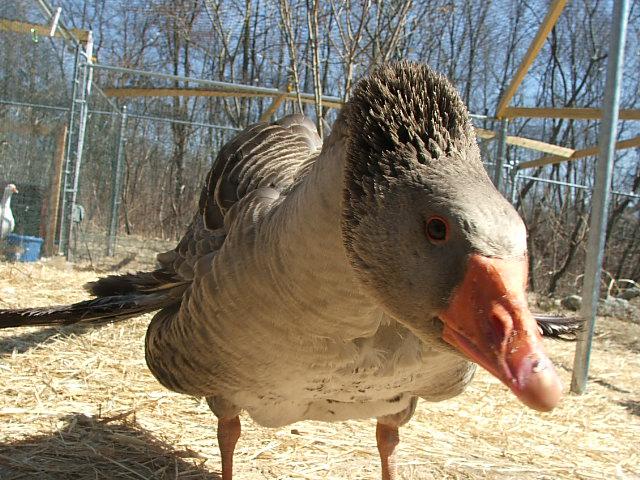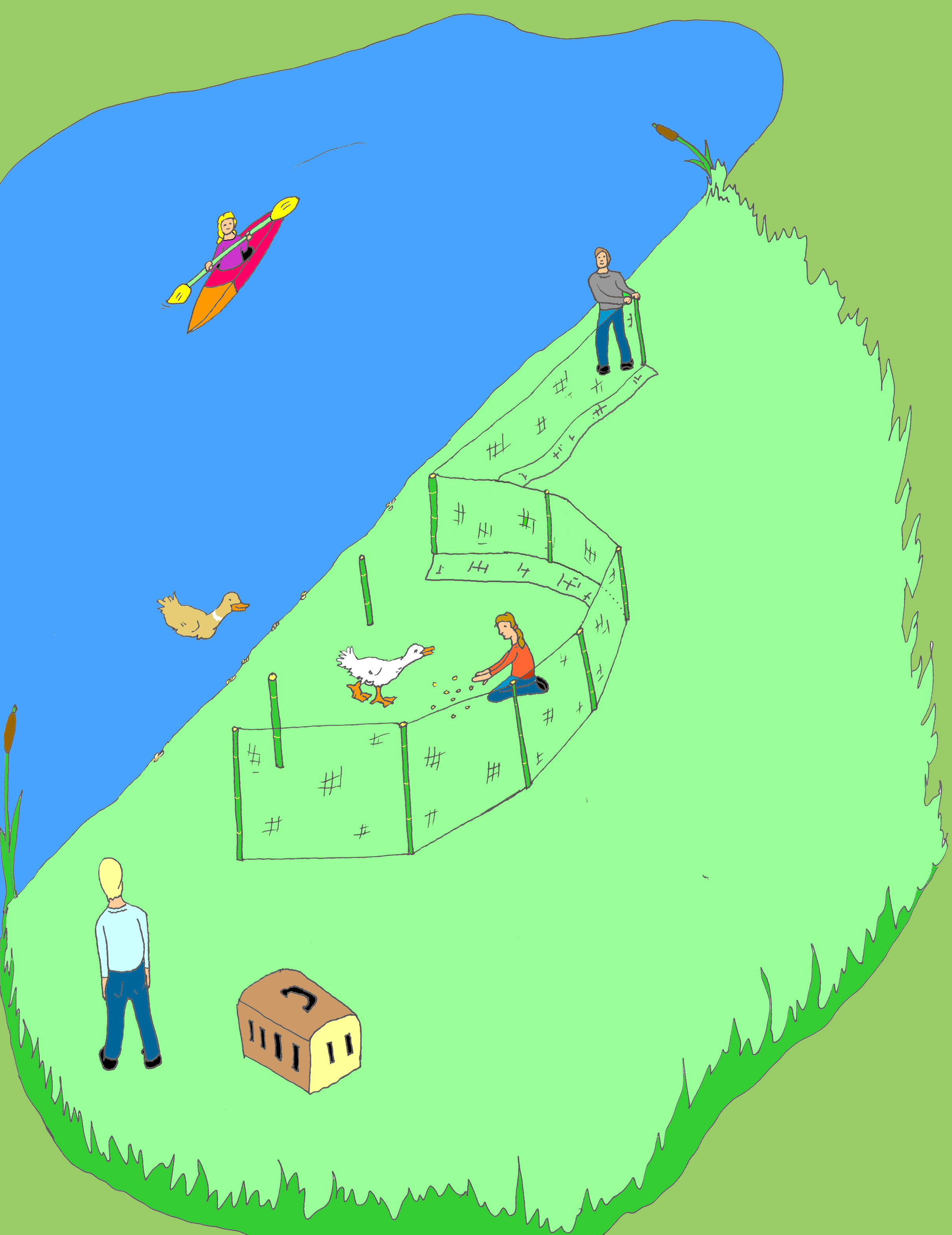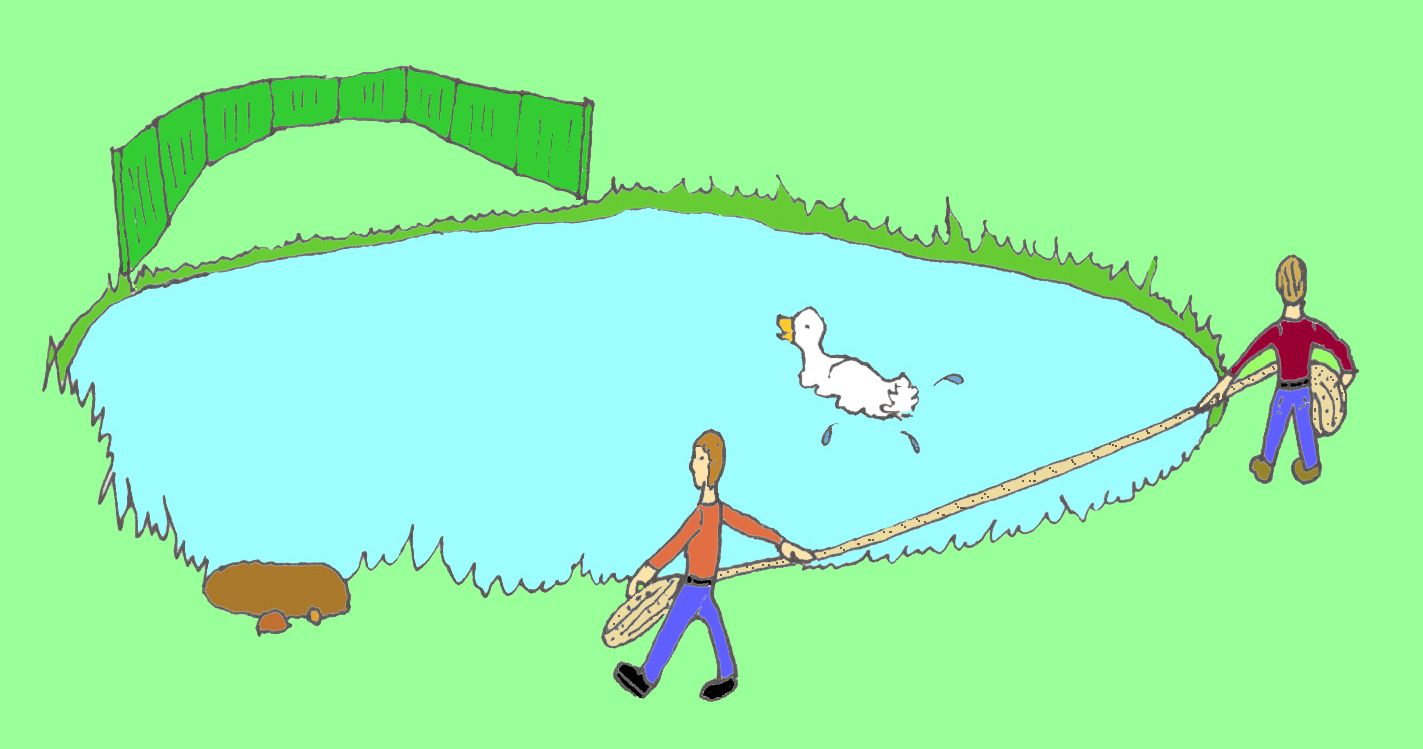|
Rescuing Domestic Ducks
And Geese In Your Area

So you've found some abandoned domestic waterfowl in
trouble and you want to help, but don't know where to
begin...
Who will catch the birds?
Unfortunately, there aren't many organizations who
will actually participate in a rescue unless the duck or
goose is already trapped, injured or suffering. And even
then, it can be extremely difficult finding a rescuer,
fireperson, animal control person or wildlife rehabber
to assist you (but that doesn't mean you shouldn't
try!). Most animal shelters don't have waterfowl
rescuers at their disposal and will require that you
take care of that part yourself and then bring the duck
or goose to them afterwards.
Alerting someone else of the situation is a start,
but rarely enough to truly help the animal escape the
trouble they're in. This means, if you really want to
help a duck or goose in trouble you're probably going to
have to roll up your sleeves and do it yourself.
Rescuing animals can be challenging. It requires
determination, preparedness and patience, but that
doesn't mean you can't do it; in fact, many people
before you have dedicated themselves to the task and
successfully rescued abandoned ducks and
geese in their area. You can do it too!
The good news is taking part in an animal rescue is
an extremely rewarding and life-changing experience.
Don't deny yourself this wonderful opportunity just
because it may be a little difficult. The more
challenging the rescue, the more rewarding the rescue
experience!
Who can take the birds after they're rescued?
There aren't many shelters equipped to handle
domestic waterfowl and many of them are full. You can
Click Here for help finding a
shelter near you (and remember to donate!).
You may not be able to find a shelter near you. In
this case, you'll have to find a safe and loving home
for your rescues all on your own. Don't let that stop
you! You can do it!
You may even find that you have to set up a temporary
home for the ducks or geese in your own backyard until
you can find a safe, new home for them. We know of quite
a few people who've done this (and even a few who
decided to keep their rescues after all!)
So now what?
Now that you've come to the realization that you are
the only advocate these poor abandoned ducks and geese
have, it's time to act the part!
Are the birds healthy or injured?
If you see injuries of any kind, you are going to
want to find a vet who can treat the birds as soon as
you have captured them. Not all avian vets handle ducks
and geese. In fact, it can be very difficult to find a
willing and experienced vet to lend a hand. It can be
even more difficult to find a vet willing to offer free
services, but it can't hurt to ask, so start calling.
Visit our Vet Finder to see
if we have any vet listings in your area.
Who owns the property?
We always advise that you get written permission from
the property owner or park foreman prior to your rescue.
If you are doing a rescue in a public area, you should
always notify the police ahead of time. Let them know
you have written permission and the date and time of
your rescue. If you don't do it, someone will most
likely call the police and you will be interrupted. You
risk losing valuable time explaining yourself when you
could be rescuing ducks and geese.
How do you ask a Park Foreman for permission?
This is what we say:
"I noticed that there are two domestic ducks dropped
off on ____ Pond in ____ Park. These were most likely
pets who were dropped off and abandoned. They are
non-flying and when the other birds migrate in the Fall,
these ducks will be left behind and will most likely die
over the course of winter. Even worse, if any other
irresponsible pet owners see them, it could inspire them
to drop off their pets as well. You could end up with a
real problem on your hands if we don't remove them
quickly. We would like permission to come in and safely
remove the ducks from this public place and deliver them
to a safe and loving home."
This line of reasoning has always worked for us; in
fact, we usually get full support of the park foreman
and the assistance of their staff. Remember when the
rescue is over to send a thank you card to the
park foreman for their assistance.
Are the birds on land or water?
Water Rescues
Most commonly, the ducks or geese are on water. Will
you be able to lure them up on land for the rescue, or
will you need to capture them on the water? If the birds
are skittish and too shy to come up on land, you will
need to find water rescue gear. If you can find someone
with a sit-down Jetski , this is your best option. It
has no propeller and is safe to use and maneuverable
enough to catch a duck or goose. Ducks and geese are
quick on water and do a lot of diving and dodging.
If you don't have access to a Jetski or boat, you can
ask the local fire dept for assistance, or if it is a
public pond, the park foreman may have access to a boat,
canoe or kayak.
You can also call and ask your local wildlife rehabbers
if they know anyone who can lend a water vehicle.
A Jetski can safely keep up with the antics of ducks
and geese who don't realize a rescue is in their best
interests. In fact, cautiously tiring them out is a
common first step before actually making capture
attempts. Do not chase them at a high speed, just a slow
and steady pace. You will start to notice that they dive
less frequently, or when they dive, they don't swim
nearly as far away from you. These are key signs that
you are ready to get out your "butterfly" net and start
working on their safe capture. You can either try
catching the duck or goose with a net, or you can safely
drive them on shore and do a land rescue.
Land Rescues
If you are doing a land rescue, you can set up a net
pen on shore. Purchase deer netting and secure it into
place using bamboo posts. Set up a
"U" shaped net on shore. Lure the ducks into the pen
with food (best time to rescue is around 8 a.m. when the
ducks are hungry). Try to get them as far into the pen
as you can. Have volunteers come into the pen and
together you can corner and catch the duck or goose.
Ducks and geese will try to escape the net and get
back to the water--their instincts tell them "water
is safe." If a duck takes "flight" (they can get
lift of 1-3 feet off the ground) get between them and
the water. They can't steer once they are in the air, so
if you get directly in front of them, you can catch
them. It's almost like catching a football--but carefully!

Rope Over Water Method for small ponds, etc:

Safe Catching
Reach out to catch a duck like you would catch a cat,
put your hands over the back of their body. Their wings
are strong so hold them in firmly (but carefully) with
your thumbs. As soon as you catch them, sit over them
and hold them in place using your legs while someone
else brings you a pet carrier and places it directly in
front of you. Then ease the duck carefully forward and
into the carrier.
If you need to, you can catch a duck by the base
of the neck--just don't squeeze. Hold on just enough to
keep them in place until you can get your arms around
them.
Remember ducks don't have teeth, so about the worst
injury you will get is a pinch or a toe nail scratch. So
don't panic during your rescue.
NEVER CATCH A DUCK OR GOOSE BY THE WINGS OR LEGS or
you may break bones or dislocate joints.
Ducks and geese often fall for a "fake left and
grab right" capturing tactic. Use this to your
advantage.
We love it when we hear there is an aggressive goose
that needs capturing. An aggressive goose won't run
away--it will come right for us. It is remarkably easy
to move faster than a goose and grab them gently by the
bill and close it. Then at the same time, scoop the
goose up with your other hand--coming from behind them
and reaching between their legs. A goose's beating wings
can cause FAR more damage than its biting bill. You will
need a partner to help hold the wings in place while you
carry the goose to its pet carrier. Most geese will not
flap their wings once they are up in the air and don't
have proper leverage, so try to clench the bill gently
closed and lift the goose up as quickly as possible to
keep the goose under control.
For more information CLICK
HERE.
More than one try...
It is not uncommon to miss some or all of the
ducks/geese on the first rescue. You want to try to
avoid leaving only one duck behind UNLESS it is a life
or death situation.
You can use captured ducks in pet carriers as lures
to get their mates off the water--this is especially
effective with geese who mate for life. If you can, try
to capture hens first because drakes and ganders will
often come off the water more easily if their ladies are
in pet carriers on shore, calling to them. Boys fall for
this trick more readily than girls.
If your first rescue attempt was not successful, and
it is not an emergency situation, take a break for a few
days and just show up at the site with food. Ducks and
geese thrive on routine. Get them back into one and
rebuild trust with food. Floating duck food or round cat
kibble (no hairball, urinary tract, or special formulas)
are recommended healthy food options during a rescue.
Try to avoid unhealthy snacks unless you absolutely need
to.
Familiar Faces
Ducks are cautious animals that like routine and
familiar surroundings. New people or change makes them
distrustful and they will flee to water quickly. Over
time, ducks or geese can become familiar and trusting of
people that feed them. This means that, if you find an
animal that is friendly and will approach you, that animal needs
YOUR hands-on help more than they need ours. When strangers show up, the
duck or goose will rarely come in close enough for catching.
Stop the cycle of abandonment
Contact your local paper and put up posters to raise
awareness regarding the issue. If you don't get this
message out to the public, you may find yourself in the
middle of an abandonment cycle. You don't want to rescue
the birds only to have new ones dropped off into the
same situation.
If you are not in need of public assistance or
support for your rescue, we highly advise sending
letters to the editor AFTER the rescue is complete. It
is not uncommon for other irresponsible pet owners to
hear you are removing animals from an area, and decide
to throw their unwanted pets into the mix to solve their
problem and add to yours.
If you are in need of volunteers or rescue gear,
going to the papers first may be your only option.
Bitter cold
We often get contacted regarding ducks and geese in
situations where it is freezing cold and the birds are
in danger of frost bite, predation, starvation or acts
of cruelty. If you are outside of Connecticut--our
range, we cannot be of direct assistance. You will need
to be these animal's advocates utilizing the information
above and throughout our website.
You will need to be the one to find them new homes,
arrange for their rescue and vet care. Help the animals,
raise awareness and stop the cycle of abandonment.
Other sources of help
You can sometimes find local assistance by joining
Yahoo chat forum "Petducksrus." It is fast, easy and
free to join. Lots of pet duck and goose lovers keep in
touch through this forum and you may be able to find
some local volunteers or homes via this forum.
We have compiled a list of other domestic waterfowl
rescuers; CLICK HERE to view
the list and see if any of them are in your area and
able to offer assistance.
Return to
"CONTACT US"
© Majestic
Waterfowl Sanctuary 2005, 2006, 2007, 2008, 2009 |

